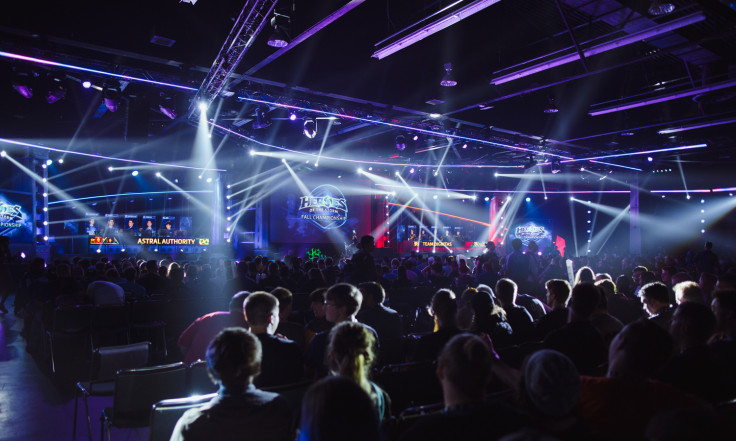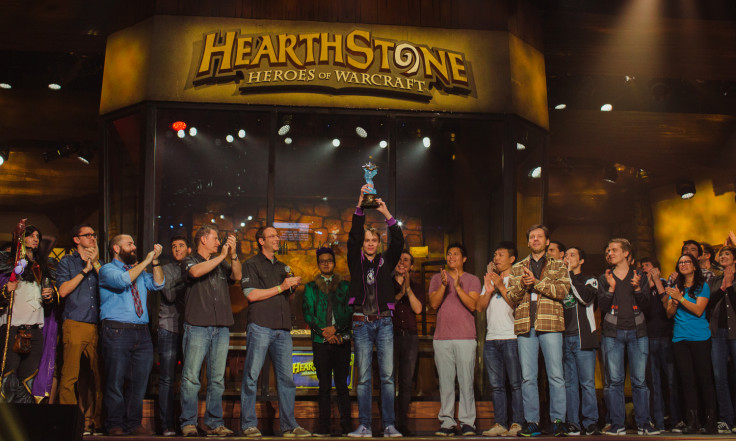How Blizzard and Overwatch League are making eSports less corporate and more compelling
Hearthstone's Jason Chayes on how Blizzard is changing eSports.

At a fresh-faced 18-years-old, and wearing a hoodie covered in video game logos, the teenager known to the online world simply as "Pavel" doesn't look like a professional anything. But as of 10 minutes ago, he's the best in the world in his chosen field. Sat behind an official Blizzcon table, beside his translator, fielding questions from several eager reporters, he commands, in this room at least, quiet, credible respect.
In stark contrast, the eSports arena just outside the curtained-off press section is deafeningly loud. His concentrated stare and Russian accent help, but Pavel, current world champion of complex card game Hearthstone, looks reminiscent of a young Garry Kasparov. If he's the equivalent of a chess grandmaster, the players next door, deep into a game of the much more raucous brawler game Heroes of the Storm, are quarterbacks, baseball batters and Nascar drivers.
As much as any NFL stadium, the eSports arena is jocular and alive. A player is killed in Overwatch, a base captured in Starcraft, and the crowd roars like they've witnessed a touchdown. For an outsider, it's hard not to feel perplexed. Sitting before you are thousands of people getting their kicks not from playing games, but watching. On stage, teenage boys with names like Firebat and iceice compete via computer for million-dollar prize pots. After winning the Hearthstone championship, young Pavel leaves Blizzcon wealthier to the tune of $250,000.
Dozens of cameramen weave through the crowds. Men in suits, holding branded microphones, ask post-match questions. Clearly eSports are popular. Only last year, television giant ESPN agreed to broadcast Blizzard's college eSports tournament "Heroes of the Dorm." If games have an image problem – if mainstream culture still regards them as a novelty – exposure of that kind, surely, will go a long way.
The players are here. The audience is here. The prize pots might seem ridiculous to some, particularly those who neglect to remember just how much professionals make in traditional sports, but the money is here, also. So what is it about eSports which still makes them seem strange? How is it that somebody who constantly plays, reads and writes about games can still find eSports baffling?
"I have a hard time categorising eSports, as a whole, into a single viewing experience," says Hearthstone's production director Jason Chayes. "Just the same way that going to a baseball game is different to going to watch football or hockey, Hearthstone is a lot different to watching Overwatch or Heroes Of The Storm. The game is set in a tavern. At an eSports event, the two players are on stage, sat inside a glass room. It's supposed to feel like watching your friends playing a game in the pub. We didn't want it to have that whole 'cyber-stadium' vibe."
Attendance is growing, competition is getting stiffer and the money keeps rolling in. But until now, the majority of competitions and teams have been private affairs – rather than national flags, players wear on their shirts idiosyncratic names and corporate brands. That's what makes eSports weird. Rather than your home team, you're supporting, tacitly, some big name brand – enjoy the spectacle or not, there is something unpleasant about cheering for team Razerware or team Monster Energy.

However, next year, Overwatch League will begin. Players will be matched based on their region – like in traditional sports, local leagues will graduate into national ones – and the best players will be picked, by fans based in their home country, to compete at the Overwatch World Cup.
Rather than manufactured teams, competing on behalf of sponsors, games like Overwatch, in the near future will be populated by teams that are easy to identify: I'm largely unfamiliar with the game, but as I watch the quarter-finals I find myself griping, to a fellow spectator, that just like in football, it's typical for England not to make it this far.
"Anecdotally, I know people who don't play the games," Chayes says. "But for them, something happens when they hear a broadcaster talking about an incredible play during a match. Maybe you can't follow exactly what's happening, but the casters can turn that into a narrative people can, at least in a sense, understand.
"We have the global games coming to Hearthstone, too. The top player from each country will be selected to represent those countries in team-based games, alongside other players whom the game's community has voted to compete. That will build some local support. You'll have players cheering for their respective countries. That kind of experience transcends familiarity with video games."
Ultimately, the identity of eSports is self-justifying. Do lots of people watch eSports? They do. Does it take skill to go professional? A great deal. Is the money kind of outrageous? Absolutely. By those measures, even to outsiders, eSports have nothing to prove.
As I leave the arena, wondering what the hell an 18-year-old would do with $250,000, I'm reminded of a web comic often shared online, in which a generic sportsman tells his interviewer: "We sportsed our best and scored points, but the other team was sportsing, too, and scored even more points." It's a smug and condescending little thing implying that physical games require base abilities and are enjoyed by people with simple tastes - the kinds of people who draw cartoons for Twitter, of course, are unquestionable connoisseurs.
If eSports need anything going forward, it's to begin representing places and peoples rather than laptop companies and energy drink purveyors. What they don't need – and are immune to by now anyway – is judgemental incredulity.
"For a game to be a good eSports game, it has to be something where skill is important," concludes Chayes. "That helps to validate the best players. Also, it's something to which spectators can vicariously connect – it lets them see the thought processes and the drama of what's happening. We have to make it compelling to watch. We have to treat players as top level competitors. If we show the amount of training, practice and effort that goes into something like this – if we show the players as role models - then it's just the same as what happens in traditional sports."
For all the latest video game news follow us on Twitter @IBTGamesUK.
© Copyright IBTimes 2025. All rights reserved.


















